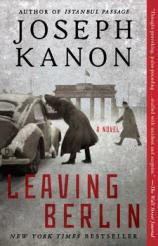Leaving Berlin
Review
Leaving Berlin
American media loves horse races, which is a good reason to avoid watching political pundits on cable TV. Book reviewers have resisted this reductionist way of considering writers, but in recent years I’ve seen Alan Furst and Joseph Kanon often mentioned in the same sentence. Furst is generally regarded as America’s master of the historical spy novel, but Kanon, with each book, has steadily gained ground.
I’m a huge fan of Furst --- I’ve praised this book and this book and this book --- but his most recent novel was such a paint-by-numbers disaster I didn’t bother to review it.
Joseph Kanon and I were college friends. In 1997, when he published his first novel, I interviewed him. I’ve read most of his books since then and reviewed ISTANBUL PASSAGE.
LEAVING BERLIN is a big book that will put Kanon even with Furst, or maybe ahead. (For me, “big” means 371 pages.) It has a terrific plot hook --- Alex Meier, a German-Jewish writer who fled the Nazis, gets into political trouble in the United States, and, in 1949, at the height of the Berlin Airlift, returns to live in his native city. If he can give useful information to American spymasters, he can return to Los Angeles and his young son; as he’s not a writer of spy thrillers, he’s a bit over his head. [To buy the book from Amazon, click here. For the Kindle edition, click here.]
"LEAVING BERLIN is a big book that will put Kanon even with [Alan] Furst, or maybe ahead.... Because almost everyone has at least two faces, the book is an onion that slowly gets peeled. For veteran readers of thrillers, this will be pure pleasure."
Kanon has written about postwar Berlin before --- THE GOOD GERMAN is set there. (It became a movie starring George Clooney and Cate Blanchett.) The gray chill of the cover photo is also in Kanon’s prose; on every page, you feel the shabbiness of the housing, the shortage of food and electricity, and, mostly, the oppressive presence of the Russians. It’s a bitter irony; the Nazi thugs have been replaced by Russian goons. Idealism? The new Socialist paradise? By 1949, even the most dedicated Socialists know better: “Nobody ever said it would be easy… A just society must be worth a few sacrifices, no?”
Alex Meier arrives with a realist’s view of the East German authorities. (In Washington, he’d been grilled by Joe McCarthy’s interrogators. “He’d seen the faces before, the jowls and smirks, when they’d been Nazis.”) He is less armored against friends from his much happier early years, and it’s no surprise that he takes up with a woman who was his first lover. But in a Kanon novel, identity is a mask. People are rarely who they seem to be. His lover, especially, but really, everyone. (Even Bertolt Brecht, a prickly genius of astonishing selfishness, isn’t quite as offensive --- he rarely bathed and stank like a badger --- as historical accounts describe him.)
Because almost everyone has at least two faces, the book is an onion that slowly gets peeled. For veteran readers of thrillers, this will be pure pleasure. For me, it’s a challenge --- my novel has three major characters, and they struggle with their single identities. But with each Kanon novel, I’m getting smarter. Soon I, like some of you, may be able to read his elegant, complex novels without gasping every few pages.
Reviewed by Jesse Kornbluth, founder of HeadButler.com on March 13, 2015
Leaving Berlin
- Publication Date: March 1, 2016
- Genres: Fiction, Historical Fiction, Historical Thriller, Suspense, Thriller
- Paperback: 384 pages
- Publisher: Washington Square Press
- ISBN-10: 1476704651
- ISBN-13: 9781476704654





